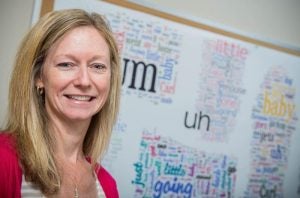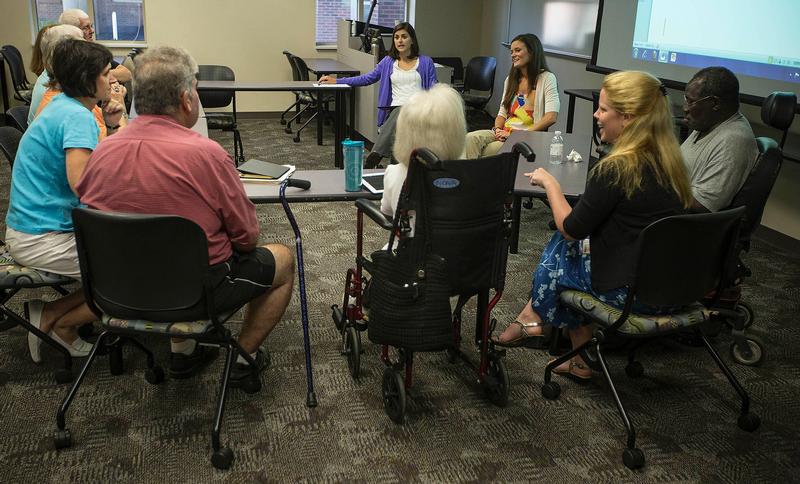ECU group activities, research help people with aphasia communicate
GREENVILLE, N.C. (Oct. 18, 2013) — A series of strokes changed Ervin and Susan Harris’ plans for retirement but not their outlook for living a good life.
Active in church and in the Bear Grass community where he and his wife live, 63-year-old Ervin Harris had four strokes just days apart in April 2011. The first came after physical therapy for knee surgery. “We went directly from rehabilitation to the emergency room,” Susan said.
At first, Ervin Harris was unable to swallow or talk but months of therapy helped him to walk, eat and care for himself again. A lingering effect has been aphasia, an acquired communication disorder typically caused by stroke or head injury which impairs a person’s ability to speak, understand, read or write but does not affect their intelligence, humor or personality.
Ervin attends the aphasia group for two hours each Friday in East Carolina University’s College of Allied Health Sciences where participants interact with graduate students and faculty in the Department of Communication Sciences and Disorders through games, drawings or other mental exercises.
“He’s a social person. Seeing other people deal with the same issues he is, at different stages, gives him hope and encouragement,” said Susan, an ECU alumna. “This group has allowed him to share his interests. That’s normalcy. Individuals don’t go back into a cocoon of illness; independence is the goal. And we’re reminded of that every week.”
The continuum of care and network of resources at ECU and Vidant Medical Center have made a difference in his recovery, Susan said. “Everything helps. We’re so thankful for where we are,” she said.
About 1 million Americans are living with aphasia and approximately 80,000 new cases are diagnosed each year. It is more common than Parkinson’s disease, ALS or cerebral palsy yet most people have not heard of it.
Research on aphasia
Last year ECU welcomed associate professor and director of doctoral education Heather Harris Wright, whose lab is dedicated to improving communication for people who’ve had stroke or brain injury.
Two of her doctoral students have a background in linguistics. “It’s a very nice complement,” Wright said. “I learn from them too – especially with their unique background in looking at the semantics of words and sentences. They have a deeper understanding of language theory and the subtleties of language.”
Wright and her masters’ and doctoral students are investigating written and spoken communication and cognitive abilities across the adult lifespan. She is recruiting people with aphasia to participate in a study.
“I’m interested in how individuals communicate and what role their memory, attention, and executive function abilities play in their ability to communicate with others,” Wright said. “One of the main goals is to develop a normative database for discourse ability for comparison to individuals with aphasia to better diagnose communication difficulties in aphasia. Ultimately we want to determine best practices for improving communication abilities in individuals with aphasia.”
As people age, memory and attention decline. “An 80-year-old tells a story very differently than a 20-year-old,” Wright said. “The intent of communication changes as we age. Older adults look at every opportunity to engage in communication, and this plays out in how they tell stories.”
Wright is seeking funding for additional studies to investigate interaction between memory and attention and communication abilities in older adults and adults with aphasia and other communication impairments. The work previously has been funded by the National Institutes of Health and National Institute on Aging.
Older adults with aphasia – where language has been taken away – are dealt a double whammy since communication is very important to social health and daily life, Wright said.
It’s important for people with aphasia to not be isolated, Wright said. “Patients can continue to improve if they stay communicatively active,” she said. “It won’t be rapid but they will improve. It can have a positive domino effect.”
Engaging with others, using language, listening, reading, emailing – anything that uses language – is helpful, Wright said.
The road ahead
Because aphasia is not well known, there often are misperceptions about people who have aphasia, Wright said. “You may hear of individuals living with aphasia who have been mistakenly confused for ‘being drunk,’ ‘not smart,’ or ‘intellectually impaired,’ ” Wright said. “Just because they can’t speak, doesn’t mean they don’t understand. Oftentimes they are able to understand every word that is said. They have their memories. They just can’t access the words to tell you about them.”
Some communication strategies include: using yes or no questions; engaging in normal activities and involving the individual in conversations; talking to the person, not about the person; using simpler sentences and emphasizing key words; repeating information if needed; giving the person with aphasia time to speak and not finish their thoughts or sentences.
The ECU aphasia group, which usually has eight to 12 participants, has been offered the past three years.
“We’re always trying to find different activities to do and contacting different aphasia groups to see what’s working,” said Sherri Winslow, clinical supervisor in communication sciences and disorders. “The class provides a connection with other people in addition to practicing communication skills. Communication is not just speaking, but writing, gesturing and reading. It’s a safe place where they can connect with others of similar experience.”
Ervin and Susan Harris have been supported by their friends and family, and hope to help educate others about aphasia.
“Just because the communication is not there doesn’t mean the intelligence and the person’s not there,” Susan said. “There is a way to communicate. When you care enough about a person, you find a way.”

Dr. Heather Harris Wright leads a research lab working to improve communication for people who’ve had stroke or brain injury in the College of Allied Health Sciences. Photo by Cliff Hollis, ECU News Services.
Ervin talks often through body movement and facial expressions, and can say a few words. He can write his name and address, Susan said. “My husband could be a quiet person, but he’s not,” she said. “Everybody has a contribution to make. Although his talents have changed, he’s still a man with purpose. There are no accidents. We’re here for a reason.”
To learn more, visit www.aphasia.org or http://myweb.ecu.edu/wrighth.
The aphasia group meets 10 a.m.-noon each Friday in Room 1305 in the ECU Allied Health Sciences building on west campus. Anyone with aphasia is welcome to join at any time. Individual therapy is also offered in the ECU speech language and hearing clinic. For more information, contact Sherri Winslow at 252-744-6142 or winslowsh@ecu.edu.
